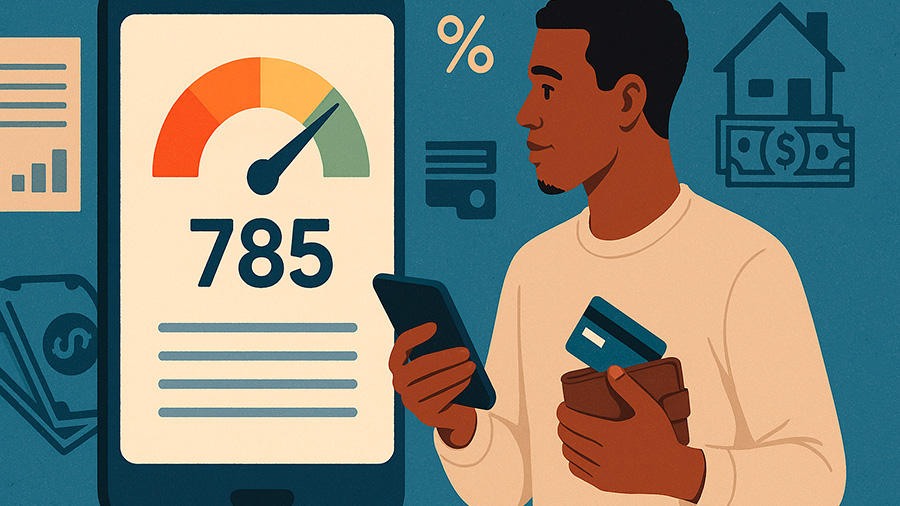The Power of Progress: How Smart Habits Can Transform Your Credit Future

In today’s financial world, your credit score is more than just a number—it’s a mirror of your financial behavior. It determines whether you can rent an apartment, qualify for a mortgage, or get a low-interest loan. Yet many people don’t realize how deeply it affects their everyday opportunities until something goes wrong. Learning how to boost your score is not just about raising digits; it’s about building trust with lenders, improving financial flexibility, and opening the door to better choices. With the right mindset and consistent actions, anyone can turn a weak score into a powerful asset.
Understanding What a Credit Score Really Is
Before you can improve it, you need to understand it. A credit score is a mathematical model that reflects your likelihood of repaying borrowed money. In the U.S., the most common version—the FICO score—ranges from 300 to 850. Scores above 700 are generally considered good, while anything below 600 can make credit access difficult. These numbers are calculated using several key factors: payment history, credit utilization, credit length, types of credit, and new inquiries. Knowing how each component works allows you to plan strategically and effectively boost your score over time.
Table: Key Factors Affecting Credit Scores
| Factor | Weight in Score | Why It Matters |
|---|---|---|
| Payment History | 35% | Shows reliability and trustworthiness |
| Credit Utilization | 30% | Indicates how much of your available credit is used |
| Length of Credit History | 15% | Older accounts demonstrate long-term consistency |
| Credit Mix | 10% | Diversity of credit types shows responsible borrowing |
| New Credit Inquiries | 10% | Too many recent applications may signal financial risk |
Why a Higher Score Matters
Improving your credit score isn’t just about bragging rights—it’s about real financial power. A higher score lowers your interest rates, saving thousands of dollars over time. It increases your chances of loan approval, rental approval, and even job consideration, since some employers check credit reports for positions involving money management. More importantly, it provides peace of mind. When you boost your score, you gain access to financial freedom—the ability to borrow when needed without fear of rejection or predatory rates. It’s not just about credit; it’s about confidence.
Real-Life Example: From Rejection to Reward
Consider Kevin, a 29-year-old from Denver, who was denied a car loan due to a 580 credit score. After analyzing his report, he found missed payments on an old credit card and high utilization across two others. He started paying down balances to below 30%, set up automatic payments, and requested credit limit increases. Within eight months, his score rose to 705. Not only did he qualify for the loan, but his interest rate dropped from 14% to 6%. The difference saved him nearly $4,000 over the loan’s term. Kevin’s story shows that anyone can boost your score through consistency and informed decisions.
Ten Rules to Boost Your Score Effectively
Credit improvement is both a science and a habit. Here are ten proven rules that help you strengthen your financial profile:
- Pay all bills on time: Payment history is the single most important factor. Even one late payment can drop your score dramatically.
- Keep balances low: Try to use less than 30% of your available credit limit. Lower is always better.
- Don’t close old accounts: Older accounts contribute to your credit age, helping your score remain strong.
- Diversify your credit: A mix of credit types—credit cards, loans, and mortgages—shows lenders you can handle various obligations.
- Limit new credit inquiries: Too many applications in a short period can make you appear risky.
- Check your reports regularly: Obtain free credit reports annually and dispute any errors immediately.
- Pay more than the minimum: Reducing principal quickly lowers interest costs and improves utilization ratios.
- Avoid co-signing loans: Another person’s missed payment can hurt your score even if it’s not your fault.
- Use credit cards strategically: Make small purchases and pay them off monthly to show positive activity.
- Be patient and consistent: Scores don’t rise overnight, but good habits compound over time.

Table: Common Credit Mistakes vs. Smart Habits
| Common Mistake | Negative Impact | Smart Habit |
|---|---|---|
| Missing payments | Significant score drop, late fees | Set reminders or automate payments |
| High credit utilization | Shows financial instability | Keep usage under 30% of available credit |
| Applying for multiple cards | Creates multiple hard inquiries | Space applications at least 6 months apart |
| Closing long-standing accounts | Reduces average account age | Keep them open to preserve history |
| Ignoring your credit reports | Errors go unnoticed and damage reputation | Review reports yearly from all three bureaus |
The Psychology of Credit Improvement
Improving credit is not only about numbers—it’s also about mindset. People often associate low scores with failure, but it’s simply feedback. Every payment, every decision is a chance to rebuild credibility. Viewing your credit report as a progress tracker rather than a judgment helps you stay motivated. Just as physical fitness improves through discipline and small daily actions, your credit health thrives on consistency. Those who successfully boost your score understand that patience is their greatest asset.
Factors That Influence How Fast Your Score Improves
Not all credit profiles respond the same way. The speed of improvement depends on several variables:
- Severity of past issues: Recovering from bankruptcy takes longer than from one missed payment.
- Current debt levels: Reducing high utilization can create noticeable changes within months.
- Age of accounts: Older credit histories provide a stronger foundation for growth.
- Variety of credit types: Having only one credit card limits improvement opportunities.
- Frequency of updates: Lenders usually report data monthly, so progress appears gradually.
Knowing what to expect keeps expectations realistic. Significant increases often occur over 6–12 months of consistent effort. The journey to boost your score is steady, not sudden, but every small step counts.
Real Example: Credit Recovery After Setback
Angela, a small business owner from Oregon, faced financial stress during the pandemic. She missed three payments on her business card, causing her personal score to drop from 740 to 610. Instead of panicking, she contacted her bank to negotiate payment arrangements and reduced utilization by paying down other cards. She also added a secured card to build positive history. Within 14 months, her score returned to 735. Her experience proves that taking responsibility and acting quickly are far more powerful than waiting for time to heal credit wounds.
Technology and Tools That Help Boost Your Score
Modern credit management is easier thanks to technology. Apps like Credit Karma, Experian Boost, and Mint provide real-time updates and analysis. Some services even allow users to include on-time payments for rent and utilities, giving additional positive data to the bureaus. For those new to credit or rebuilding, secured cards and credit-builder loans from online lenders can accelerate progress. Leveraging these tools creates a structured environment for success and makes the process of boost your score more transparent and manageable.
Long-Term Strategies for Sustaining a High Score
Once your score improves, maintaining it requires discipline. The same principles that raise it will keep it high. Continue paying bills on time, manage debt wisely, and monitor reports for errors. Avoid unnecessary credit cards, and resist the temptation to overspend just because you can. Treat credit as an instrument of stability, not luxury. When used correctly, it becomes a lifelong ally—one that supports major life milestones like homeownership, education, and entrepreneurship. Sustaining boost your score habits ensures that your financial foundation remains solid, no matter what life brings.
